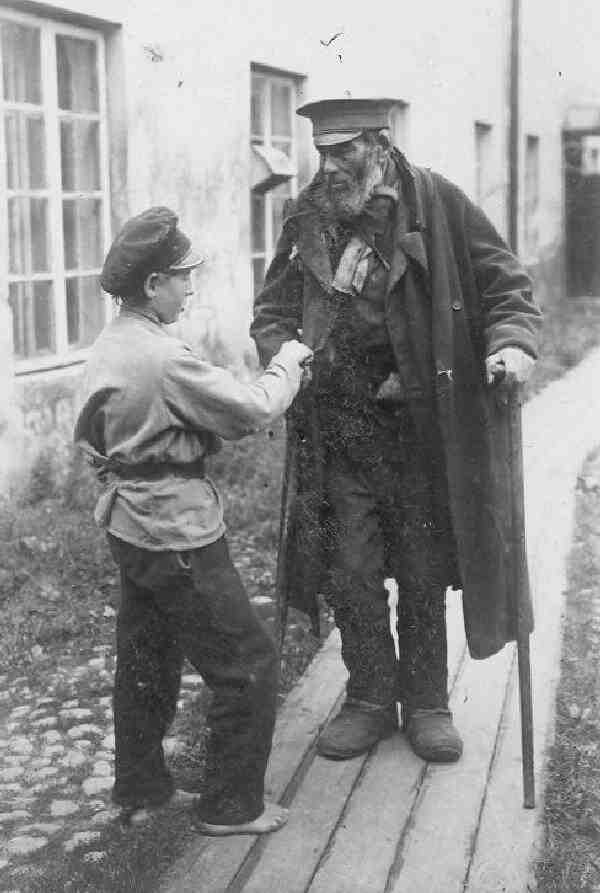
German Jews Chronology: Imperial Germany

Figure 1.-- We are not sure how to interpret this photograph. It came from Germany, but that does not mean that it was taken in Germany. We might have guesssed Poland or Russia. The German source believes that the boy and elderly man are Jewish. I am not sure why, perhaps the old man's beard. He believes that the photograph was taken about 1915.
|
|
Germany had one of the most assimilated Jewish communities in Europe. German Jews became proud members of the rising German middleclass. They received full citizenship rights in Imperial Germany. They entered many professions including medicine and the law and came to play an important role in German universities. Not all Germans agreed with this, but Chancellor Bismarck did. Germany had a histoical tradition of anti-semitism. Such sentiment increased as a wave of Russian Jews fleed to Germany in the late 19th century because of pogroms and a variety of government anti-Jewish measures. (Many Russian Jews fleeing Tsarist oppression also came to America.) Germany was not in the 19th century an unusually anti-Semitic country. Anti-Semitism certainly existed as it did throughout Europe. Pogroms enspired by the new Russian Tsar Alexander III drove Jews west into Germany as it did to America. In Germany the influx of Eastern European Jews stimulated anti-Semitism thought, but no overt action against the fully enfranchised Jewish community occurred in Imperial Germany.
Germany had one of the most assimilated Jewish communities in Europe. German Jews became proud members of the rising German middleclass. They received full citizenship rights in Imperial Germany. Not all Germans agreed with granting Jews full civil rights. this, but Chancellor Bismarck did. Jews as a result, entered many professions including medicine and the law and came to play an important role in German universities. Jews became especially prominent in certain disciplines, one of which was nuclear physcics. Jews were also prominent in many economic sectors, especially retailing and the clothing industry. German Jews except for those recently arrived from Russia were fully assimilated into German life. More and more were marying gentile Germans. Many were becoming non-practing Jews. German Jews for the most part dressed and spoke like other Germans.
Russian Pogroms
German anti-semtism increased as a wave of Russian Jews fleed to Germany in the late 19th century arrived in Germany. The Jews were driven west because of pogroms and a variety Tsarist anti-Jewish measures. (Many Russian Jews fleeing Tsarist oppression also came to America at this time.) The pogroms were largely inspired by the Russian Tsar Alexander III drove Jews west into Germany as it did to America. The new Tsar shaken by the assasination of his father sought to deflect growing criticism of the monarchy and absolutisn to the age old target--Russia's Jews.
German Anti-Semitism
Germany had a histoical tradition of anti-semitism, as did other European countries. Germany was not in the 19th century an unusually anti-Semitic country. Anti-Semitism certainly existed as it did throughout Europe. Until after World War I, German anti-semitism did not appear especially virulent or outside the European norm. In Germany the influx of Eastern European Jews stimulated anti-Semitism thought, but no overt action against the fully enfranchised Jewish community occurred in Imperial Germany. Chancelloe Bismarck in particular rwspected the Jews and considered them valuable citizens. There was, however, a great deal of what might be called 'polite' anti-Semitism, that is people who would not dream of violence, but avoided Jews socially. Kaiser Wilhelm II enginered the retirement of Chancelloe Bismarck. And the Kaiser famously wrote, Jews and mosquitos are a nuisance that humanity must get rid of in some way or another. I believe the best would be gas." Historians have generally dismissed this as bluster, but it showed that something was lurking below the surface. And the terrible tragedy of World War I brought it to the surface. It was of course German defeat and humiliation in the war. But one wonders if anti-Semitism would have also surfaced in a victorious Germany.
HBC

Navigate the Boys' Historical Clothing German pages:
[Return to the Main German Jewish page]
[Return to the Main German racial policy page]
[German choirs]
[Hitler Youth]
[German school uniforms]
[German royalty]
[German sailor suits]
[Lederhosen]
[Ethnic]
[Tights]
[Long stockings]
Navigate the Boys' Historical Clothing Web Site:
[Introduction]
[Activities]
[Biographies]
[Chronology]
[Clothing styles]
[Countries]
[Bibliographies]
[Contributions]
[FAQs]
[Biographies]
[Images]
[Links]
[Registration]
[Tools]
[Boys' Clothing Home]
Created: August 17, 2003
Last updated: 1:44 AM 3/5/2011



